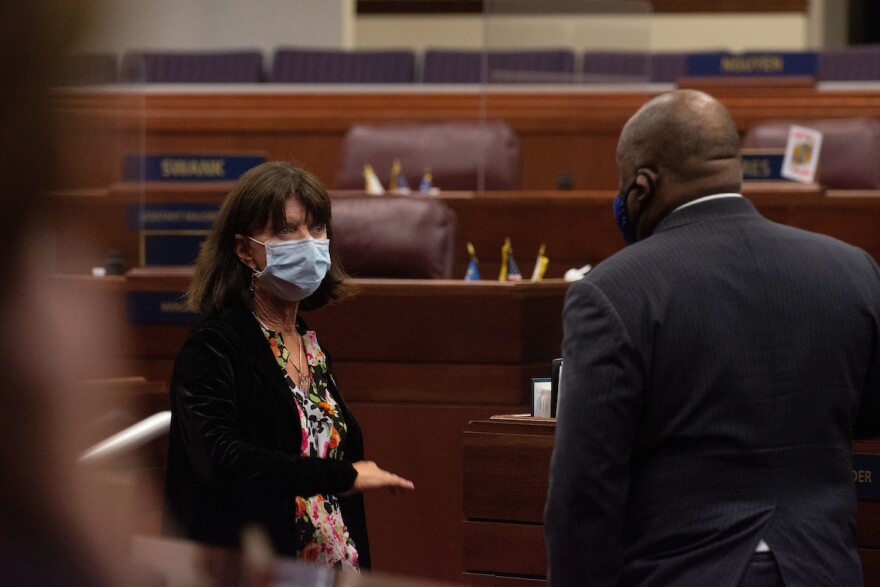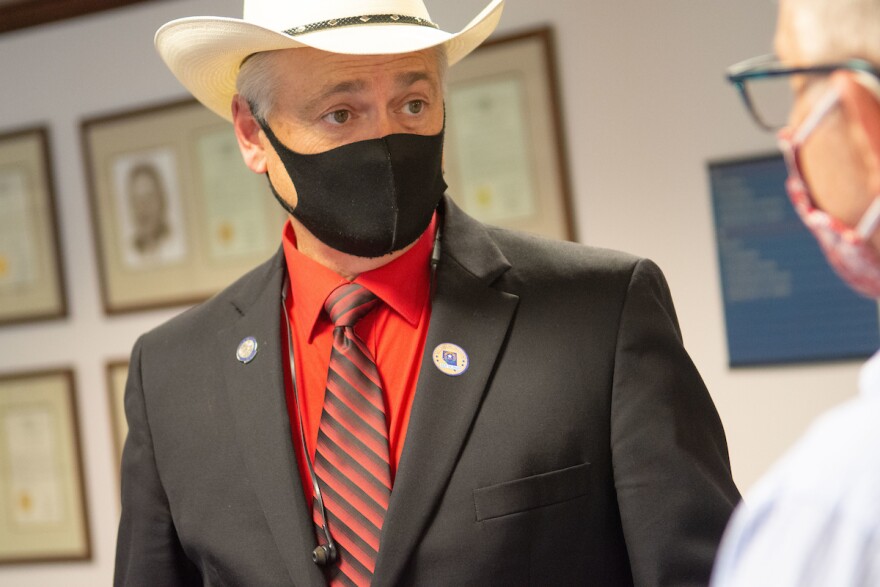Lawmakers in Nevada have officially slashed hundreds of millions of dollars from the state budget, closing a massive budget shortfall. KUNR’s Paul Boger has been reporting from the legislature and has this story.
After 12 days of budget presentations, partisan debate, and emotional pleas from residents, lawmakers in Nevada finally ended the 31st Special Session late Sunday evening.
As part of their final act, lawmakers approved a massive budget bill known as AB3. The omnibus bill formally reduces the state budget of nearly every state agency.
Speaking ahead of the final vote, Senate Majority Leader Nicole Cannizzaro of Las Vegas told reporters cutting the budget was no easy task and required tough decisions for everyone.
“I am hopeful that we will have bipartisan support to say that we care about the things that we have made decisions to add back and to take responsibility for our job as legislators, which is to balance this budget and to look at all the options in order to do so, which is what we have spent this time doing,” Cannizzaro said.
AB3 passed with bipartisan support, but that was only after a late-night showdown in the Assembly earlier in the weekend.
Under a previous version of the bill, Democrats primarily focused on restoring the state’s healthcare budget in order to continue pulling down additional dollars from the federal government for programs like Medicaid.
Categorical K-12 education funding, however, was still among those programs facing massive cuts. Republicans took umbrage with the Democrat’s priorities and voted en masse against the measure, arguing that leadership hadn’t done enough to look for additional money outside of raising taxes.
Democrats then held the bill overnight Saturday, only to bring an amendment earmarking $50 million in federal CARES Act money for students who need extra help with reading, are non-English speakers, or are on free and reduced lunch.
It was a move Republican lawmakers sought throughout the session, even as Democratic leaders pushed to effectively raise taxes on mining companies in the state. Assembly Minority Leader, Republican Robin Titus of Wellington, thanked Democratic leadership for bringing forward the amendment.

“I think what we see with this particular amendment is that there is indeed monies out there, which we've been saying all along, there's money,” she said. “Thank you for finding this money and thank you for prioritizing kids.”
AB3 also caps the number of furlough days for state workers at six for the current fiscal year which ends June 30, 2021. Originally, another measure looked to institute 12 furlough days over the same period. However, lawmakers did not address furloughs for employees of the Nevada System of Higher Education. Instead, it’s the Nevada Board of Regents call.
The measure also redirects more than $138 million that lawmakers swept back into the general fund from other accounts. Most of that money, about $80 million, will now go to health care programs for Nevada’s neediest residents offsetting much deeper cuts.

For Senate Minority Leader, Republican James Settelmeyer of Minden, the original proposal would have left many of the state’s poorest residents without the care they need.
“The cuts that were sent from the governor were pretty draconian," Settelmeyer said. "They involved getting rid of people’s arms and legs, basically getting rid of the prosthetics program, getting rid of the teeth program -- the dental program -- within HHS. Luckily, both sides were able to realize that those were not acceptable. We sat down. We found pockets of money that were available. We didn’t have to raise taxes and we were able to lessen those cuts.”
Ultimately though, the economic fallout associated with the COVID-19 pandemic will likely last years. And for Democratic Senator Julia Ratti of Sparks, the hundreds of millions of dollars in budget cuts are only a short-term fix.
“I think it’s a bridge," Ratti said. "I think it’s a bridge to February when we’re all here again for 120 days to figure out how we’re going to stabilize our state, how we’re going to protect our economy, and how we are going to fund the essential services of the state so we can continue to prosper.”
So far, Governor Sisolak has signed three of the five bills to come out of the special session. He says he intends to sign the other two, which includes AB3, at a later date.
As a note of disclosure, all KUNR staff members are employees of the Nevada System of Higher Education as the Board of Regents holds the license to the station. To see all of KUNR’s coverage of the 31st special session, visit our website at: kunr.org.







